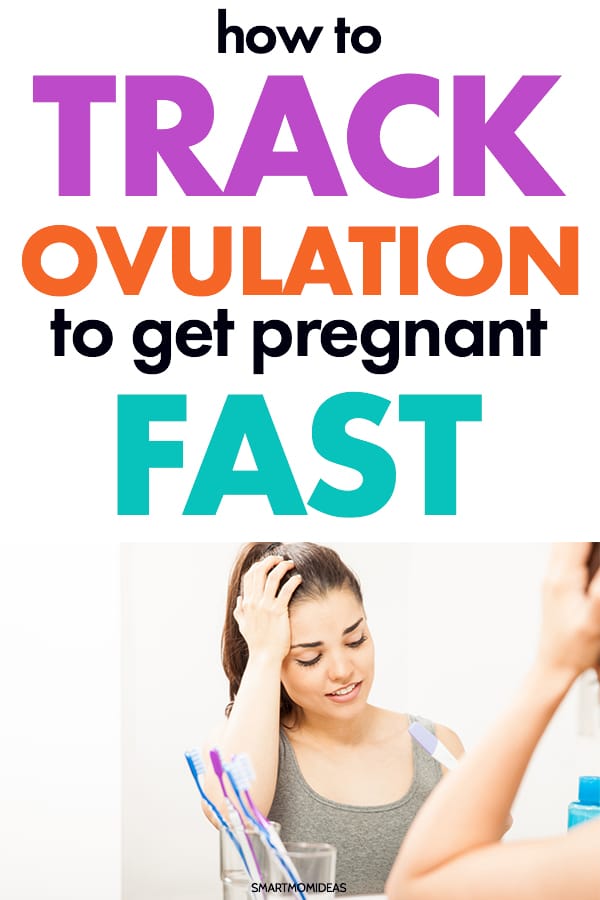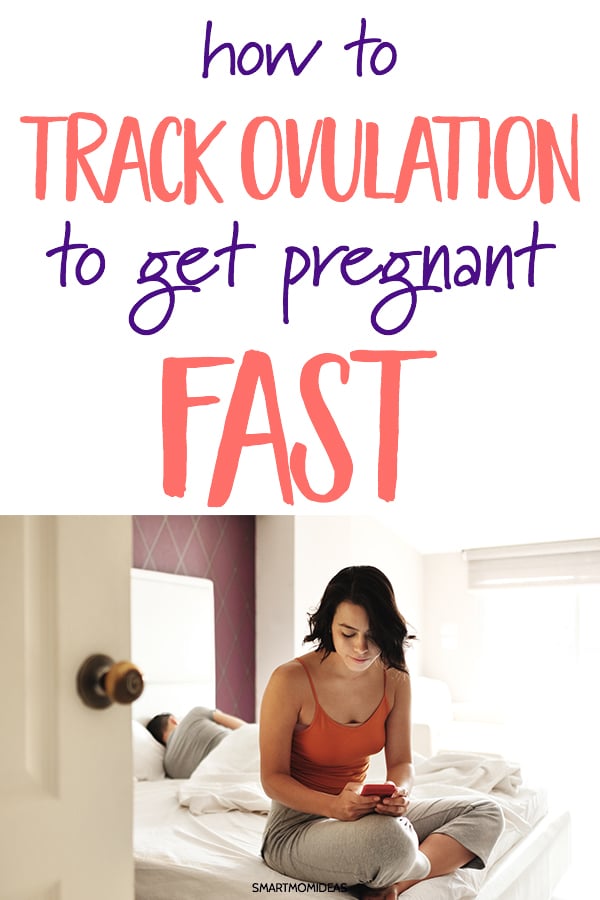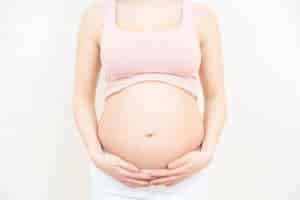Learn how to track ovulation to get pregnant quickly!

So you have made the life-changing decision to have a baby, now the fun begins of actually trying to make the baby.
*Wink Wink*
While some women don’t need help conceiving by tracking their menstrual cycles and ovulation, others do. Actively trying to get pregnant can be difficult for many couples.
I can’t tell you about the countless stories that I have heard about couples trying so hard for years with tracking cycles and doing everything “by the book” that could never get pregnant.
Then one night they stopped thinking about it and working at it so hard and just had fun.
Then, BOOM, pregnant!
The moral of the story here is to just be relaxed about it from the beginning.
Don’t stress yourself out about getting pregnant. Think happy baby thoughts!
Your mindset is a powerful thing, so use it to your advantage.
With that in mind, let’s go over what ovulation actually is, the signs that you are ovulating, how to track your ovulation and tips and tricks for conceiving fast.
What is Ovulation?
There is much more to your cycle than just the 3-7 days of bleeding and cramps.
Ovulation is just part of your menstrual cycle. It generally happens between day 14 to 28 of your cycle when an egg is released from your ovary in preparation for fertilization.
The evolutionary goal of ovulation was to conceive.
If the egg is not fertilized with a sperm, it is then shed with other tissues and the uterine lining during the menstruation process of your cycle.
The whole process of ovulation begins between day 6 to 14 of your cycle, with the release of FSH, or follicle-stimulating hormone. This is the hormone that matures the egg within your ovary to then later be released.
When the egg is ready to be released there is an influx in a different hormone called LH, or luteinizing hormone.
This triggers the egg to be released and ovulation occurs within the next 28 to 36 hours. This is known as your peak fertility days.
Many women do not have a typical 28-day cycle, which means that tracking your ovulation to try and conceive can become more difficult.
Signs of Ovulation
While there are certain methods of tracking ovulation, your body also provides you with signs to signal that you are ovulating.
One of the telltale signs of ovulation is an increase in vaginal discharge.
Often women will experience an increase in a clear and mucus-like vaginal discharge.
Some women will experience light bleeding or spotting, generally right before their actual period.
Others will experience tender breasts or an increased sex drive.
In addition, some women may experience pain in their ovaries.
While it is useful to take note of potential symptoms associated with ovulation, it is also suggested that you track your cycle to ensure you are giving yourself the best opportunity to become pregnant.
Why Do You Need To Track Your Ovulation?
As I said, your menstrual cycle can drastically differ from the “normal” 28-day cycle. If you are able to track your cycle, including your ovulation and menstruation, you will have a better chance at conceiving.
Every woman is unique and you should not strictly rely on a set cycle for your conception method.
There are many different ways to track your ovulation so that you can optimize your time in the bedroom.
How To Track Your Ovulation
Whatever did women do before smart devices?
How on earth were they able to track their ovulation cycles before apps and testing strips were invented?
Good old fashioned counting the days.
Your ovulation cycle typically occurs on the 14th day AFTER you have STARTED your period. The six days prior to ovulation are your “fertility window.”
Therefore if you typically get your period in the middle of the month (say the 1st of the month just to make this a little easier), then your fertility window would be between the 8th and the 13th of the month.
So, these are your optimal times to engage in sexual intercourse as they are your best possible chances of conceiving.
But the good news is that technology has made it easier than ever to be able to track your ovulation, making it easier to determine your high and peak fertility windows.
Fertility Monitors
There are so many neat fertility trackers out there today. While none of them can guarantee that you will become pregnant, they can certainly help to determine when you are most fertile.
Clearblue Fertility Monitor
The Clearblue Fertility Monitor comes with a monitor and urine test strips to track the two key fertility hormones, estrogen, and luteinizing hormone. The monitor helps to identify all of your fertile days of the month.
When you use the monitor on a daily basis it will provide you with a quick snapshot if it is a low, high, or peak fertility day.
You have about two peak days per month, which are your most fertile days during active ovulation, in addition to a few higher fertility days.
Ava Fertility Tracker
The Ava Fertility Tracker is a digital fertility tracking bracelet that helps to take the guesswork out of your high and peak fertility days.
The Ava Tracker is an innovative new way to track fertility that does not solely rely on urine testing but rather takes note of many psychological parameters to help determine peak fertility times.
It takes into account, body temperature, breathing rate, resting pulse rate, heart rate variability, which help you to detect your fertile window in real-time.
Simply wear Ava while you are sleeping and synch with your phone when you get up. You can even use it to help track your pregnancy!
Fertility Apps
Clue Period and Ovulation Tracker
The Clue app brings together science and research to help uncover all the secrets of your personal biology. This ovulation tracker helps predict your peak fertility days, with the ability to get a more accurate reading by logging your daily basal body temperature.
Flo Period and Ovulation Tracker
This easy to use app helps you to track your period, ovulation, and most fertile days.
The app utilizes machine learning to help improve your experience and results. With tracking your cycle, periods, and PMS symptoms, Flo will help to identify your more fertile days all with beautiful handy charts.
Tips For Conceiving
There are several things that you can do, in addition to tracking your cycle, to increase your chances of conception.
From your physical fitness to your mindset, use these tips and tricks to give yourself the best possible chance at optimizing your fertility window.
Take a Prenatal Vitamin
There are tons of prenatal vitamins on the market to choose from. Make sure to choose one that includes folate, iron, and vitamin D, which all help to prepare your body for fetal development.
You can also opt for a Conception vitamin which helps to promote a healthy reproductive system.
Eat A Pregnancy Promoting Diet
In addition to taking supplements to help promote your reproductive health, you should also be eating a diet rich in foods that help to promote a healthy conception and pregnancy.
These are foods that are high in essential nutrients such as folic acid, B vitamins, and healthy fats.
Some great fertility promoting foods are:
- Leafy greens-iron and folic acid
- Avocado-healthy fats
- Salmon-omega 3
- Full-fat Greek yogurt-healthy fats and protein
- Organic eggs-vitamin D and DHA
- Berries-antioxidants
- Beans and lentils-protein and fiber
- Oatmeal-vitamin B and fiber
- Citrus-vitamin C
- Olive oil-monounsaturated fats
- Nuts and seeds-zinc and vitamin E
If you really want to pack a nutritional fertility punch, add some Maca powder to your diet. Maca is a superfood touted for its many benefits on fertility and reproductive health.
It goes great mixed in a smoothie or oatmeal. Maca has additional health benefits for men, including fertility, so encourage your partner to add some to his diet as well.
Kick Those Bad Habits
Smoking, drinking, or doing drugs is not going to help you conceive a healthy baby.
If you are serious about getting pregnant (which I’m guessing you are if you’re reading this), then give your body the best chance you can by quitting the vices that could hinder a healthy conception.
Keep A Healthy Body Weight
If you are underweight or overweight that can affect your chances of natural conception.
If a woman is underweight and she does not have enough fat on her body to effectively carry a child to term, then she might be able to get pregnant.
Women who are overweight can also take twice as long to conceive than those that are at their “normal” BMI.
When women are carrying around excess fat, they can then overproduce estrogen which hinders the fertility process making it more difficult to conceive.
The good news is that you don’t have to be ovulating to become pregnant.
While your chances are going to increase during the ovulation process, viable sperm can actually live in the reproductive tract for up to 5 days.
Meaning if you engaged in sexual intercourse leading up to ovulation (those higher fertility days I mentioned), there is a chance that you could become pregnant outside of your peak ovulation window.
So track your ovulation and think happy, beautiful baby thoughts!





Leave a Reply